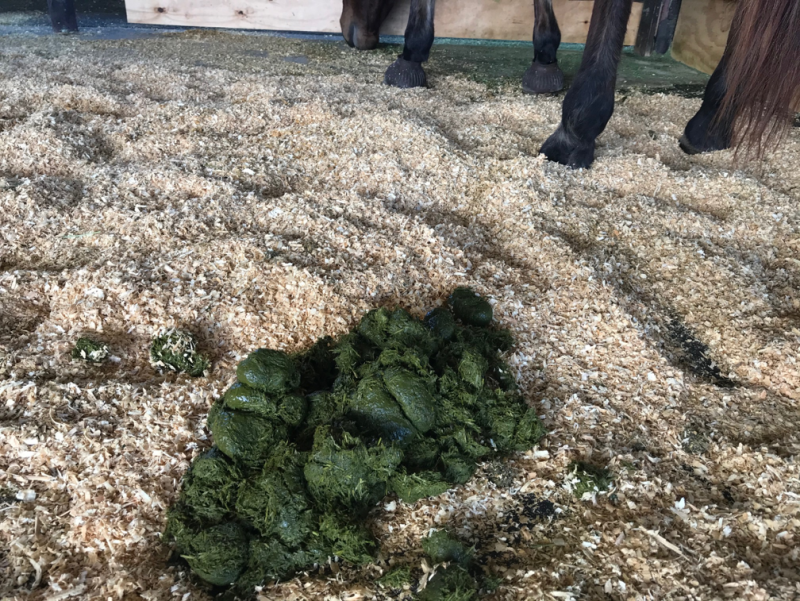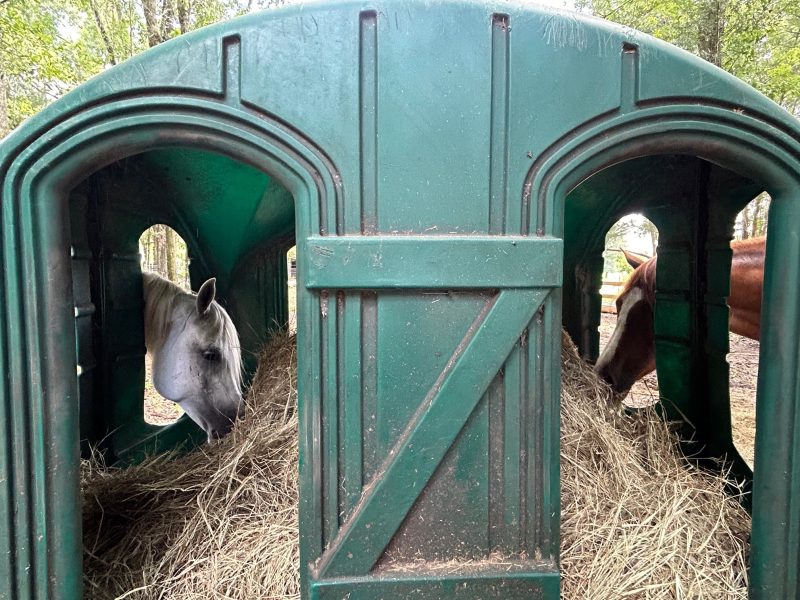Carissa Wickens, Associate Professor and Equine Extension Specialist, University of Florida Animal Science Department
Monitoring your horse’s normal defecation frequency, and the color and consistency of their manure is an important aspect of equine health management and welfare (Figure 1). While sometimes overlooked, regularly observing for, and making note of changes in manure can help horse owners detect early signs of trouble (e.g., illness or digestive disturbances) and provides useful information when working with your veterinarian to quickly address health concerns. If your horse is forming normal manure (well-formed fecal balls) but is producing and expelling liquid when they pass manure or at other times, this loss of fluids from their anus indicates a gastrointestinal disturbance known as Free Fecal Water Syndrome (FFWS). Research investigating the underlying cause of FFWS remains limited, but this article provides an overview of what is currently known regarding symptoms and contributing factors; with an emphasis on the role forages may play in the development of FFWS, and recommendations for management of this condition.

Figure 1. Monitoring your horse’s normal defecation frequency, and the color and consistency of their manure is an important aspect of equine health management and welfare. Credit Carissa Wickens, UF/IFAS
–
There is often confusion between FFWS and diarrhea, but these are not the same issue. When horses have diarrhea, the consistency of the manure itself is loose and contains more liquid than usual. Horses with FFWS do not normally display any other symptoms of illness and FFWS is not associated with infectious causes of diarrhea. However, the watery feces runs down the buttocks and hind legs, which can cause skin irritation, and the messy and odorous discharge is unsightly, can also attract flies, and requires constant maintenance. FFWS is not life-threatening, but it is a condition that should be monitored and addressed in consultation with your veterinarian and other equine professionals (equine nutritionists and extension agents can provide additional information and guidance).
–
Symptoms of FFWS
Most horses affected by FFWS appear healthy. They are usually in good body condition and are behaving normally. FFWS may last from a few days to months or even years, and the severity of the condition may change over time.
The following are common signs of FFWS:
–
-
Wet fecal matter on the hind legs, tail and around the anus
– -
Fecal matter stains around the anus and hind legs (liquid phase fecal matter stains in these areas)
– -
Skin irritation or lesions on areas exposed to watery feces (due to presence of fecal matter and increased frequency of washing these areas)
– -
Signs of discomfort when defecating, excessive tail swishing after defecation and/or treading or stamping of the hind legs following defecation
– -
Bedding and stall walls frequently dirty with fecal water
– -
Abdomen appears bloated or distended
–
Potential Causes of FFWS
Stress and dietary imbalances that contribute to the horse having difficulty managing or resorbing water within the gastrointestinal tract are implicated in FFWS. Interestingly, while FFWS has been reported in many breeds, risk of having FFWS was found to be greater in geldings than mares, and in horses with a lower social rank within the herd.
Forage type and the fiber content of the diet, particularly sudden changes in the type or amount of fiber can lead to digestive disturbances (e.g., changes in gut permeability) and FFWS. Maintaining a consistent source of hay can be difficult, particularly for smaller equine operations where owners can only store small batches of hay and must replenish hay supplies frequently. Even if the type of forage hasn’t changed, the maturity and nutrient composition of the hay sourced at various times of the year or from different locations/producers can affect digestibility and water holding capacity in the horse’s hindgut, which can lead to an increase in free fecal liquid. FFWS is commonly seen when horses transition from pasture to hay (during the fall for most horses in Florida as the warm-season pasture grasses go into dormancy and reliance on hay as the primary forage source increases) or from a softer, leafier hay to a hay that is more mature and stemmy (changes in fiber composition).
–
Management Recommendations
Evaluating the horse’s diet and assuring any changes in the horse’s feed are made gradually over a period of 7-10 days can be helpful in managing FFWS (this applies to changes in forage, not just to changes in concentrate, i.e., the grain or commercial feed product used). Providing access to good quality forage throughout the day can help promote the integrity and health of the horse’s gastrointestinal tract. Alterations to your horse’s environment that help reduce social stress and competition for feed may also help reduce the occurrence of FFWS.

Figure 2. Changes in the type of forage offered to horses, and transitions between pasture and hay should be made gradually. Credit: Carissa Wickens, UF/IFAS
–
Summary
Free Fecal Water Syndrome (FFWS) can cause concern for horse owners, and while not a life-threatening condition, can have negative impacts on horse comfort and welfare. It is important to monitor changes in your horse’s manure and defecation patterns and to consult with your veterinarian and other equine professionals to address concerns, and to devise nutrition and management strategies that support proper gastrointestinal function and health.
–
